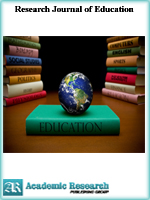Research Journal of Education
Online ISSN: 2413-0540
Print ISSN: 2413-8886
Print ISSN: 2413-8886
Quarterly Published (4 Issues Per Year)

Archives
Volume 8 Number 1 March 2022
Experiences of Teachers While Teaching at Home During the COVID-19 Pandemic
Authors: Kristopher K. Garza ; Kelly S. Hall ; Gijs van Oort ; Judith Gonzalez-Rodriguez ; Kastaylia Garcia
Pages: 11-16
DOI: doi.org/10.32861/rje.81.11.16
Abstract
The purpose of the study was to assess how the COVID-19 pandemic impacted the experiences of teachers as they transitioned to teaching online. The researchers investigated the experiences of 81 teachers of grades 4-12 in South Texas while teaching at home during the pandemic. An online survey using a 3-point scale, posed questions to teachers about their experiences with administrative support, technical difficulties, communications capabilities, and personal wellbeing under pandemic protocols. Findings showed that teachers experienced a lack of administrative support and reported deteriorating wellbeing conditions. Daily contact with students and colleagues and weekly contact with parents was reported. Decreased social time was experienced by teachers as were increased stress and frustration levels. Most respondents observed different online learning capabilities among students from different social backgrounds. We conclude that teaching from home offers additional stress factors for teachers which- if this type of teaching needs to be equally effective to classroom teaching- will require guidance, administrative encouragement, and assistance in maintaining stable levels of wellbeing. Future research may consider the impact of such support mechanisms on teacher effectiveness.
Effectiveness of Principals’ Roles on School Performance: Perspective of School Principal-Ship
Authors: Dr. Daniel K. Mbangula ; Dr. Isaacs Albert
Pages: 1-10
DOI: doi.org/10.32861/rje.81.1.10
Abstract
This paper was about analyses of the principals’ effectiveness on school performance and how principals play a major role to make the school do well in terms of academic results. Furthermore, the paper discussed why it is important to have good leaders (principals) in schools who are able to contribute to the school’s effectiveness in terms of school performance. The mixed-method was employed in this study as both descriptive and statistical data were used. In addition, the study included 30 participants who comprised both principals and teachers. The results revealed that the majority of teachers disagreed that their principals are not highly effective while some principals seem not to be well acquainted with the knowledge of the effectiveness of principals’ roles.



